On this page
Clinical Practice Guidelines Are Out
The National Cervical Screening Programme (NCSP) Clinical Practice Guidelines 2023 for Cervical Screening in Aotearoa New Zealand are now available, and are for use from 26 July when HPV testing becomes the primary screen for cervical cancer prevention.
The Guidelines have been developed for practitioners providing health services across the cervical screening pathway. They provide a standardised national approach in order to assist providers to achieve best-practice outcomes.
The Guidelines define screening pathways and clinical management guidelines for use when the NCSP changes to human papillomavirus (HPV) primary screening, with an option of self-testing using a vaginal swab. This is a major change to the cervical screening programme in Aotearoa New Zealand. Cytology will continue to play an important role in the management of those who test positive for HPV.
We are aware the sector has been keenly waiting for these Guidelines. Our thanks go to everyone in the health sector who has contributed to the drafting and editing of them. The Guidelines can be found on the NSU Health Professionals’ website at https://www.nsu.govt.nz/health-professionals/national-cervical-screening...
Educational Video Now Available
The updated educational video -- Overview of HPV Primary Screening– has now been completed and can be found on the NSU Health Professionals Education and Training Page https://www.nsu.govt.nz/health-professionals/national-cervical-screening...
It is aimed at giving health sector professionals a high-level background on the benefits of transition to HPV primary screening for the prevention of cervical cancer.
This will be the first in a series of planned educational and learning tools to be made available. Keep an eye out for our updates as more resources become available.
What’s happening with the HPV Primary Screening Project
The Road to Rollout
The Road to Rollout
We continue to make progress towards the launch of HPV primary screening in late July, as phase one of the implementation. Commencement of the Foundational Phase will be contingent on a structured readiness approach anchored in safety, quality and equity.
Group Manager, HPV Implementation and Innovation, Rachel Mackay says it has been an absolute pleasure to meet NCSP regional coordinators, screen-takers, Support to Screen providers and primary care across the motu – “I continue to be so impressed by people’s dedication, professionalism, hard work and passion for screening and the difference it can make to people’s lives.
“You will see in this newsletter an update on the extensive engagement that we’ve been doing with the sector and readers will be interested in training and resources that will be coming on stream.”
A Phased Roll Out
A Phased Roll Out
The transition to HPV primary screening will be achieved in a phased approach – three phases in total -- with 26 July being the first day when HPV testing becomes Aotearoa New Zealand’s primary screening test for cervical cancer prevention.
The first phase from late July is the Foundational Step. In this phase participants will be able to choose a self- or clinician- taken swab, or an LBC sample which will first be tested for HPV, and if HPV is detected cytology will be performed. New clinical pathways and the new NCSP-Register will be established. There will be a particular focus on Māori and Pacific participants and increasing screening in the under- or unscreened populations.
The second phase will be called Expanding Reach and will extend from August to December. The focus is on getting more people onto the screening pathway through notifications and new approaches, including under- and unscreened populations both not enrolled in primary care and those enrolled. Better information on screening histories will be available.
The third phase will be called Full Benefit and will extend to March 2024. This is where the full future vision of HPV primary screening will be achieved. A more complete pool of participants will be encouraged into screening, increasing our screening coverage, patient experience and whānau satisfaction. All workforces involved in providing HPV primary screening services will have access to the right information to do their role in supporting wāhine and whānau.
What will be achieved:
- HPV testing as the primary screening test – HPV testing will find more pre-cancers and prevent more cases of cervical cancer, supported by the speculum and colposcopy tests within the pathways.
- New NCSP-Register – A master database for screening records and individual schedules.
- New pathways – Embedding more choice and flexibility into screening, removing barriers to entry and better supporting and increasing equitable outcomes for Māori and Pacific people.
- Additional workforce and training – Accredited cervical screen-takers/GPs/midwives to do HPV testing as well as the speculum test. Other clinical workforces will be trained to support HPV primary screening, this will also be expanded through to our non-clinical workforce.
More information will be coming through our engagement with you explaining how different parts of the sector will be impacted by the change to HPV primary screening.
Engagement with the Sector
Engagement with the Sector
The HPV Primary Screening Project Team are ramping up our engagement with sector groups to share the latest information on the Road to Rollout. We are currently engaging in a series of regional screen-taker hui across the motu. The purpose of our presentations is to build awareness, specifically on the changes, training and support for the transition to HPV primary screening.
A big mihi to the regional teams we have been working with to get these sessions scheduled. We have really appreciated the commitment you have for your region and assisting us with getting education out to the sector.
Education sessions have been held for screen-takers in Hutt Valley, Wellington, Wairarapa, Taranaki, Tairawhiti, Nelson Marlborough Districts, Bay of Plenty (Tauranga, Whakatane, and Rotorua) Otago Southland Screen-Takers (online), West Coast Screen Takers, Waikato Screen Takers, Hawke’s Bay Screen-Takers and Comprehensive Care, Mahi Tahi (Northland) PHO, and Canterbury/South Canterbury Screen-Takers
These sessions have been well received and more than 1,500 attendees to date. In a number of regions, we have met with stakeholder groups as well as the Screen-Taker update
Education sessions are scheduled for
- early June - Hauora Taiwhenua (Rural GPs) webinar
- 6 June – Goodfellow webinar - Auckland/Northland Screen-Takers (Register for free at https://www.goodfellowunit.org/events-and-webinars/hpv-primary-screening...(link is external) )
- 28 June – Mid Central Screen Takers (online)
The HPV Project Team are also hosting an online session for anyone who hasn’t had an opportunity to attend one of the Screen-Taker sessions in the regions. The session will be held on Tuesday 13 June from 7-8.30pm.
If you would like to attend that session, please send an email to HPVScreen@health.govt.nz(link sends e-mail) and we will send you the invitation.
Priority Group Clarification
All women who are either under-screened or who have not been screened for cervical cancers, regardless of ethnicity, are continuing to be prioritised by Te Whatu Ora to lift their screening rates.
There has been no reduction in our focus on supporting the health of Asian women through cervical screening. They continue to be a priority given there are a number who remain either under screened or not screened. This is why we are continuing to target them (and others) through a number of health promotion and communication campaigns aimed at increasing screening rates.
But with clinical evidence showing that Māori and Pacific women continue to suffer from a much higher mortality rate from cervical cancers than other ethnic groups, we are shifting some of our focus and funding to give more targeted support to this group.
As of March 2023, 67.5% of all eligible women had received a cytology screen within the previous three years. For Māori women, the screening rate was 55% and for Pacific women, the rate was 55.9%. For Asian women the rate was 59% and for ‘Other’, the rate was 74.6%.
Currently, Māori have around twice the incidence and mortality from cervical cancer than for ‘Other’ groups. Pacific women also have higher rates of cervical cancer incidence and mortality. While Asian women have lower rates of screening, their cancer rates are not higher than ‘Other’ groups.
This clinical evidence has led the National Cervical Screening Programme (NCSP) to propose prioritising funding for free cervical screening from July 2023 for Māori and Pacific women, as well as any women who are under-screened and who have never been screened, including Asian women.
This proposal is yet to be finalised by Te Whatu Ora – Health New Zealand.
Other updates
Webinar and Resources
Webinar and Resources
We continue to update our Resources page on the NSU website with questions and answers from recent engagement hui with the sector. The page can be found here.
Online Training Modules
Online Training Modules
Online training modules are expected to be available from mid-June. The modules will be a key part of training and education for the sector alongside other educational resources.
The first module will provide an in-depth look at how the screening programme will be from July 26. It will include information on the HPV virus, an overview of the new pathways and supporting participant decision making.
Other modules will:
- teach the new clinical pathways and include clinical scenarios as a teaching method. It will also focus on managing results
- cover the history of the National Cervical Screening Programme; informed consent and addressing inequities
- cover communicating with participants in a mana-enhancing way. The module will include conversation modelling with participants to support positive screening experiences.
These modules will be available to all roles across the sector but tailored for a clinical audience.
Unit Standard Update
Unit Standard Update
We are pleased to announce that the updated unit standard for cervical screen taking has been approved by NZQA. Toitū te Waiora with Te Whatu Ora undertook a review of Unit Standard 29556, Undertake Cervical Screening.
Accreditation of nurses to support cytology procedures as part of follow up and surveillance will continue to be an important part of the new clinical pathway. Public consultation was undertaken from 16 December to 23 January and subsequently the new standard was endorsed by the HPV Primary Screening Project Steering Committee before being submitted to NZQA.
The link to the unit standard will be live on the NZQA website in June and we will be engaging with training providers about the changes.
Parliamentary Review Committee
Parliamentary Review Committee
The 2021 Parliamentary Review Committee (PRC) report into the NCSP has been tabled in the House of Representatives and is now published on the NSU website here:
https://www.nsu.govt.nz/health-professionals/national-cervical-screening...
Alongside the report is a summary document outlining Te Whatu Ora’s response and next steps.
(Note: The PRC report is referred to as the 2021 report because it was commissioned by the Minister of Health at the end of 2021. However, it was completed throughout 2022).
NCSP Policies and Standards
NCSP Policies and Standards
Work is progressing on updating the NCSP Laboratory and Colposcopy Policies and Standards. They are going through the editing process before they can be published.
New HPV Primary Screening Resources
New HPV Primary Screening Resources
Work has begun on the development of the public-facing resources for the new HPV primary screening programme. The first foundation resources will be available before the transition to HPV testing, in both English and Te Reo. Further resources (and translations) will be made available in the later stages of rollout.
Awesome Mahi Around the Motu
Awesome Mahi Around the Motu
HPV korero is being shared around the motu.
NCSP Senior Portfolio Manager Nadine Riwai shared korero to the New Zealand Nurses’ Organisation (NZNO) Women’s Health College conference on 6 May in Tauranga.
Pictured are: Chantelle Hill (Lead Colposcopy Nurse, Waikato), Lauren Moore (Nurse Colposcopist and Hysteroscopist, Waikato), and Nadine Riwai.
Did you know? … that if you are a NZNO member, you can apply for free to join the Women’s Health College Women's Health College (nzno.org.nz). See details here(link is external).
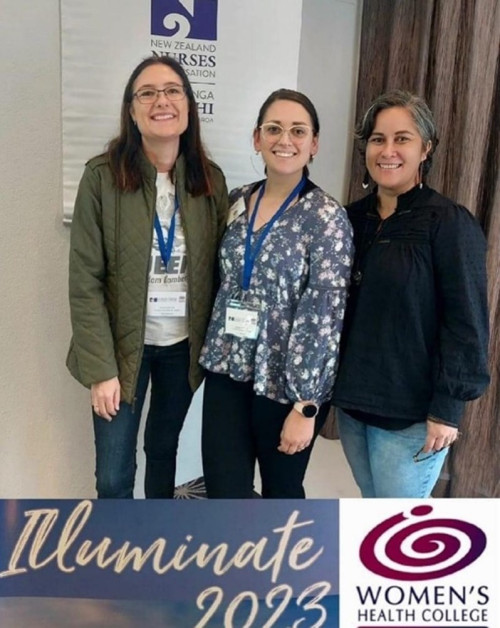
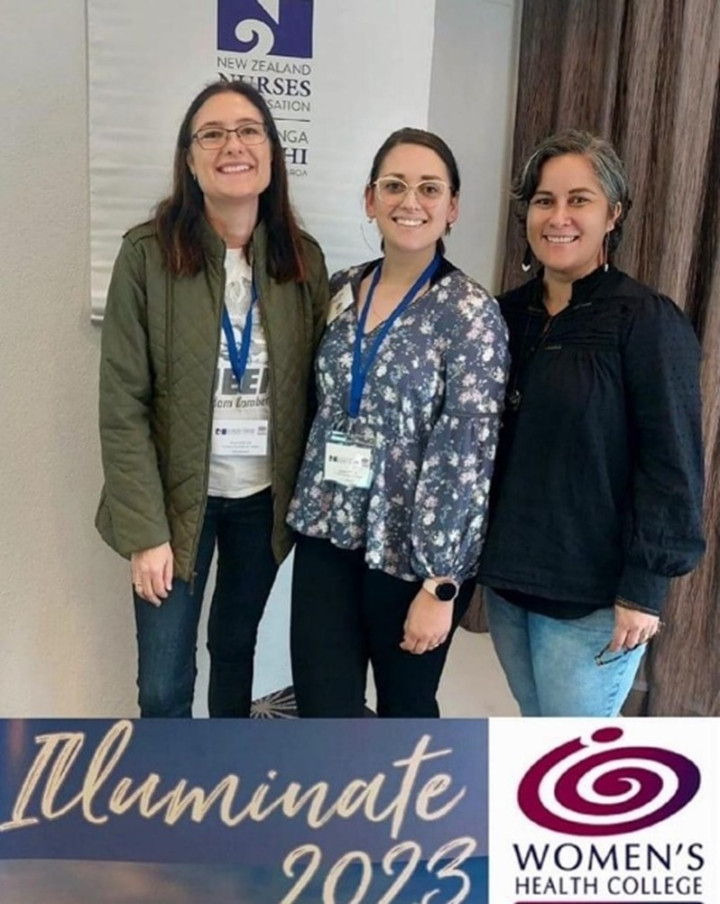
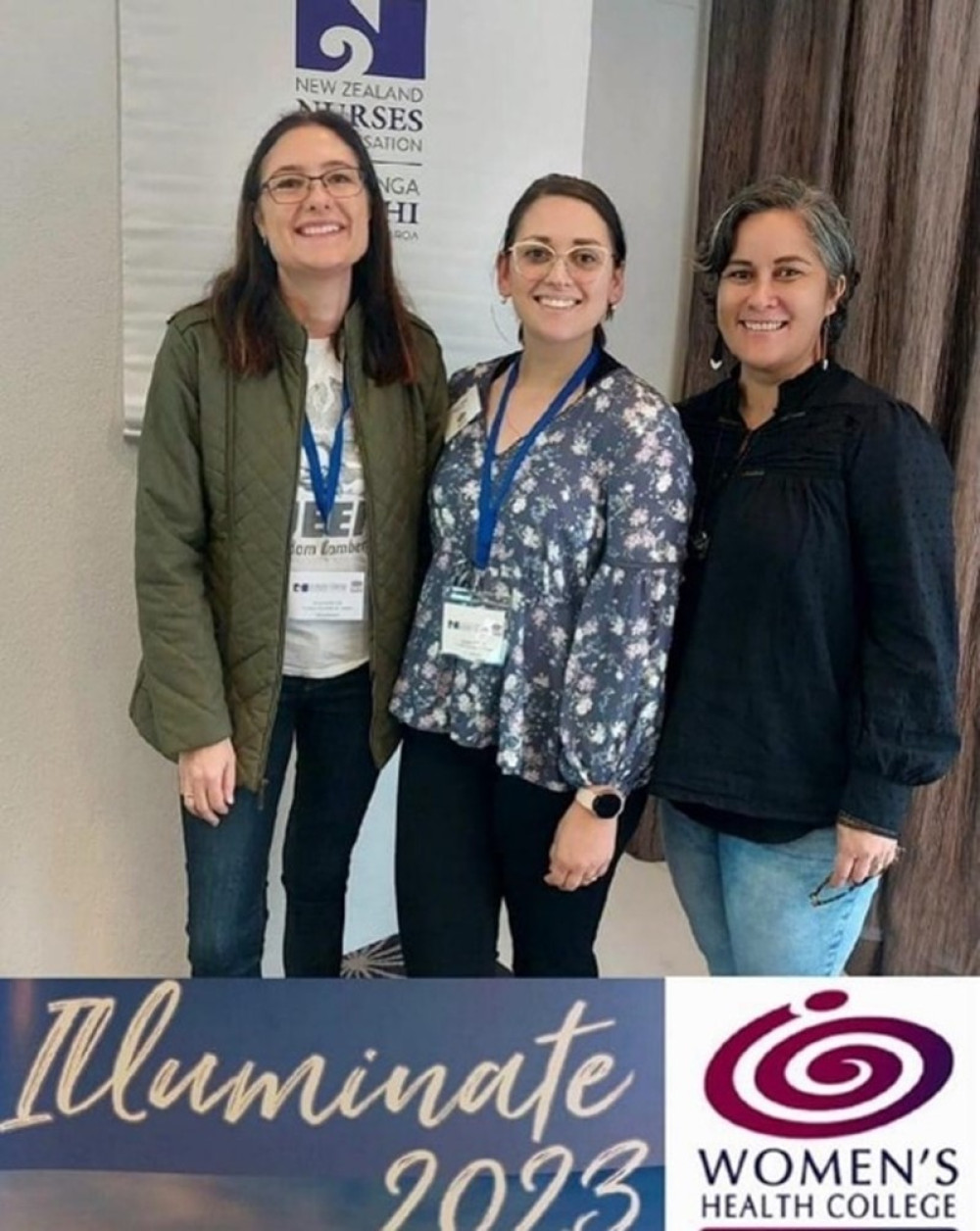
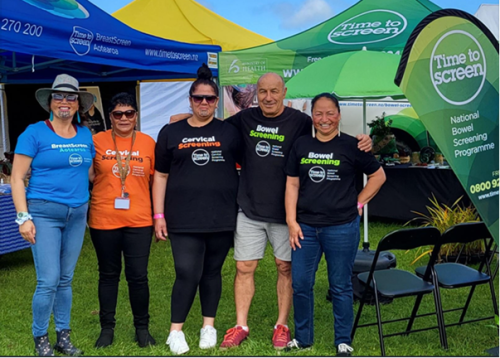

The Tai Tokerau Screening team providers photographed at the A&P Show. Team members (left to right) are Louisa Kingi, Annette Te Hira, Vicky Maihi, Stuart Selkirk and Tina Quitta.
The Tai Tokerau Screening team providers photographed at the A&P Show. Team members (left to right) are Louisa Kingi, Annette Te Hira, Vicky Maihi, Stuart Selkirk and Tina Quitta.
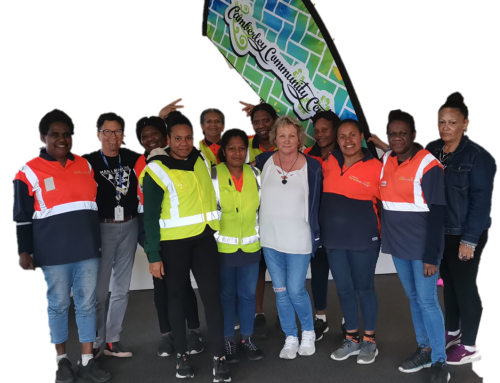
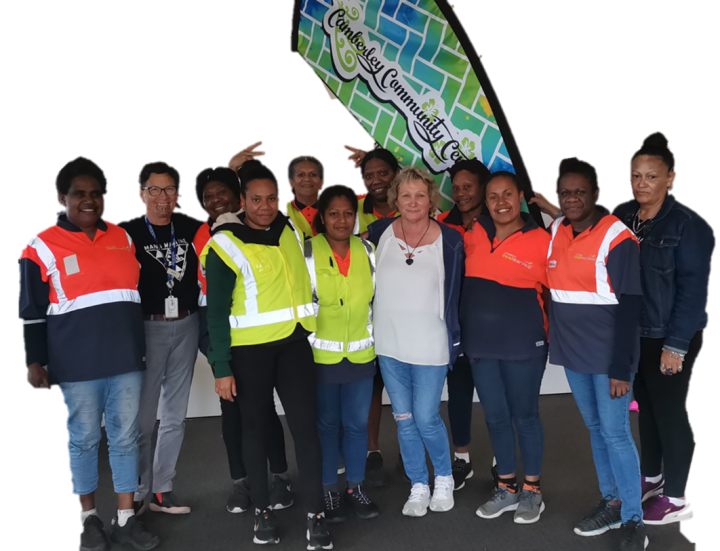
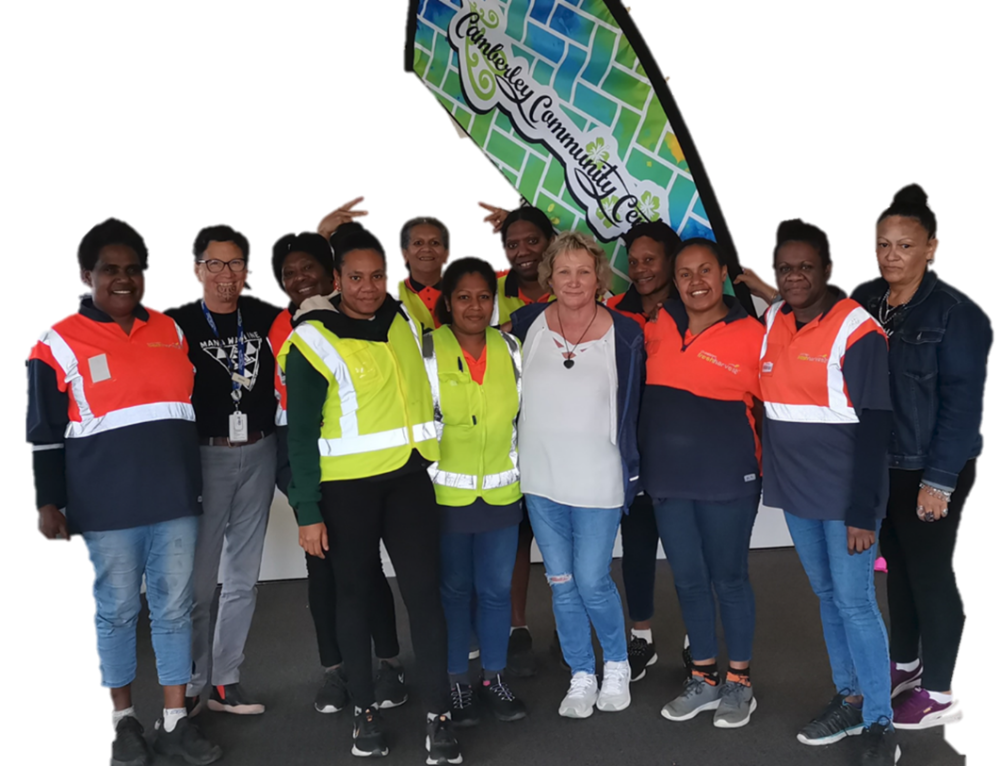
The Te Whatu Ora Te Matau a Maui Population Health Screening Team for Cervical and Breast Screening (Kaiawhina and Nurses) and Pacific team in collaboration with the Napier Medlab Team, held a Wellness Clinic at the Camberley Community Centre and Heretaunga Women’s Clinics. Six Orchardists and Pastoral Carers attended these days welcoming and supporting the Pacific RSE (Recognised Seasonal Employees) to have their free cervical screening done.
They do not have the privilege of this option in their homeland (Vanuatu, Solomon Islands, and Tuvalu Islands). Being on work visas in Aotearoa for short periods of time mean they do not qualify for free cervical or breast screening.
None of this would have been possible without Elva Birch and her team from Medlab, who sponsored them to have their cervical screens done for free. Te Whatu Ora Te Matau a Maui appreciates the time and care the nurses give when doing their screens. A total of 40 RSEs were screened over a 3-week period with another 51 to be screened.
The above picture after their cervical screen, paints a thousand words with smiles from Vanuatu the Kiwi Crunch RSEs, nurse Donna, Pacific community support worker Leslie (Splash) and Olwyn the carer and support person.
The Te Whatu Ora Te Matau a Maui Population Health Screening Team for Cervical and Breast Screening (Kaiawhina and Nurses) and Pacific team in collaboration with the Napier Medlab Team, held a Wellness Clinic at the Camberley Community Centre
HPV primary screening – Lab talks
HPV primary screening – Lab talks
Dr Margaret Sage (NCSP Clinical lead, Pathology and NCPTS Cytopathologist) has provided information videos for HPV primary screening, written to train lab staff.
These are free to access and available on the National Cervical Pathology Training Service site. Click on HPV primary screening training in the top lefthand corner of the homepage. No login needed (see top left of the page): https://ncpts.co.nz/(link is external)
After each talk, there is a set of 10 Multiple Choice Question clinical scenarios to practise applying the guidelines. Anyone is free to answer the questions – you need to enter your name as instructed at the beginning if you are answering the questions. (This is just so we know you aren’t a laboratory staff person because the labs staff are getting a certificate and CPD points if they complete the training).
No one will be looking at the answers for anyone outside the laboratory sector workforce. You can use a dummy name if you want to, but we would really encourage people to work through the questions as it really makes you think about the guidelines.
Lab FAQ Page
Lab FAQ Page
Pathlab have posted some Frequently Asked Questions on testing procedures and test-kit ordering for HPV primary screening on their website. The page can be viewed at https://www.pathlab.co.nz/hpv/
Immunisation Update
Immunisation Update
Aotearoa Immunisation Week was held from 29 May to 4 June – thank you for your support and mahi to increase opportunities for vaccination in our communities.
We have added more Aotearoa Immunisation Week assets in Dropbox here and the full suite now includes:
- email banners
- social tiles
- images for a Facebook cover
- digital screen display imagery for use on screens in healthcare centres
- editable flyer
- editable posters
For any other School-based Immunisation Programme collateral like consent forms for use by health professionals please visit the HealthEd website here.
NCSP Advisory and Action Rōpū
NCSP Advisory and Action Rōpū
The rōpū will met on Thursday 25 May (in person hui). Minutes of previous meetings are in the process of being updated and can be found here.
Support to Screening Services web page
Support to Screening Services web page
The web page for our SSS teams supporting the work of both the National Cervical Screening Programme (NCSP) and BreastScreen Aotearoa (BSA) has been updated to include a new provider in the Hutt Valley. The page is available here.
Screening support services are available for eligible wāhine/whānau who are referred to, or who independently access services from the support to screening providers. This support can assist wāhine/whānau who experience barriers to accessing breast and cervical screening, assessment, and treatment services. Some support to screening providers have mobile teams who make community visits and home visits, while others are based in clinics around the motu.
Coverage app
Coverage app
The NCSP coverage app is available at https://tewhatuora.shinyapps.io/nsu-ncsp-coverage/
Answers to Your Questions
Answers to Your Questions
We are receiving regular feedback and questions to HPVscreen@health.govt.nz(link sends e-mail). More information is available on the website here.
Staying in touch
If you have colleagues who would also like to receive this monthly update, they can join the distribution list by emailing us at HPVscreen@health.govt.nz(link sends e-mail) . We really appreciate your feedback and are here to answer any questions you may have.